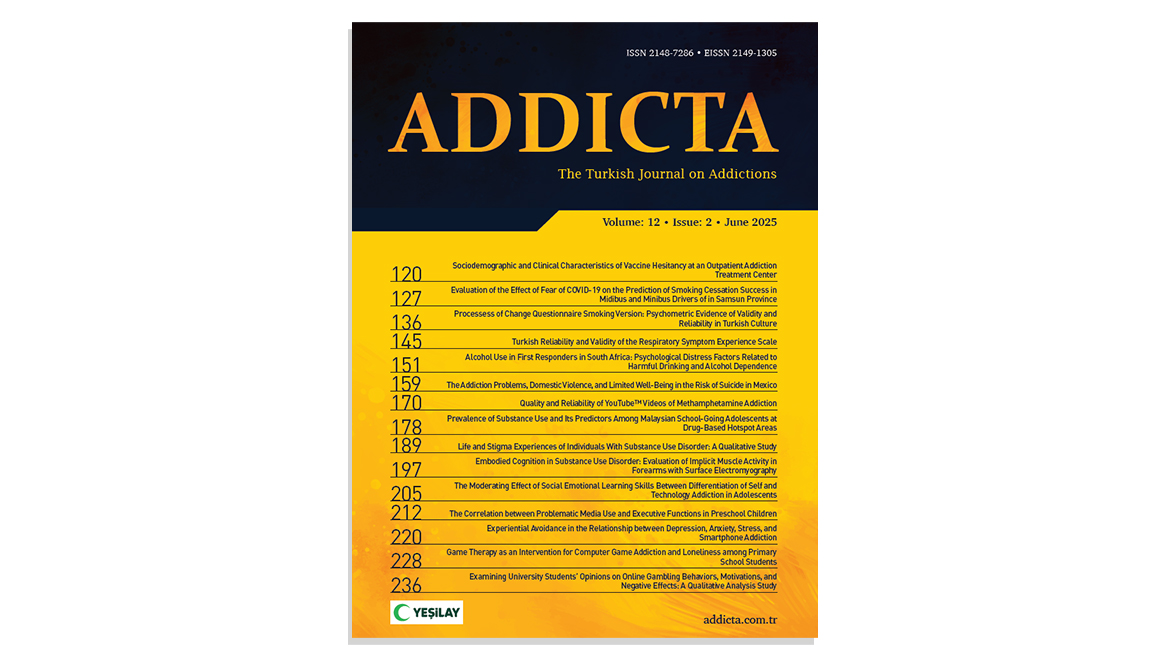

Open call for the Addicta special issue focusing on "Alcohol Use and Alcohol Use Disorder”
Manuscript Submission Deadline:
30 September 2024
Cüneyt Evren (Prof. Dr.), Liman Psychiatry and Psychotherapy Center, Green Crescent Scientific Committee Member
The focus of the special issue of Addicta: The Turkish Journal on Addictions, published quarterly by the Green Crescent Society of Türkiye will be on "Alcohol Use and Alcohol Use Disorder" in 2024.
Addicta is a peer-reviewed, academic journal that publishes research addressing the problem of addiction. The aim of the journal is to be a medium for international and interdisciplinary original, scientific studies, produce qualified discussions on addiction and contribute to the formulation of policies on addiction in Türkiye. Therefore, in addition to technical competence, the studies to be published are expected to make new and original contributions to addiction debates. Thus, the aim is to contribute to the pooling of information that will be utilized by individuals and/or institutions working in the field of addiction in Türkiye.
Addicta publishes original research, experimental and clinical studies, policy analyses, case studies and book reviews in the fields of health sciences, public health, criminology, forensic medicine, nursing, toxicology, psychiatry, sociology, psychology, psychology of religion, educational sciences, law, communication, philosophy and social services (also qualified studies outside these fields).
Alcohol use is the leading cause of death and disability worldwide, especially among adults. High alcohol intake is a major risk factor for heart disease and stroke, liver cirrhosis and some cancers, but even low and moderate alcohol consumption increases the long-term risk of these diseases. Alcohol-related illnesses and injuries impose high costs on society. A causal relationship has been established between the harmful use of alcohol and various mental and behavioral disorders, other non-communicable conditions, and unintentional and intentional injuries, including road traffic accidents, violence and suicide, as well as the incidence or outcomes of infectious diseases such as tuberculosis and HIV. Non-communicable diseases (NCDs) are the result of a combination of genetic, physiological, environmental and behavioral factors, and modifiable behavioral risk factors for NCDs include an unhealthy diet, tobacco use, physical inactivity, as well as harmful alcohol consumption.
The aim of this special issue is to compare the national and international dimensions of alcohol use and the effectiveness of alcohol control policies based on scientific evidence in line with the World Health Organization Global Alcohol Action Plan and SAFER criteria, and to ensure the dissemination of alcohol control policies in accordance with scientific evidence.
Manuscripts to be submitted to the special issue may include research and book reviews on the following topics and/or different themes, provided that they are within the scope of the main title of "Alcohol Use and Alcohol Use Disorder":
Addicta
-
The Epidemiology of Alcohol Use Disorder (AUD):
-
Prevalence of AUD in various populations
-
AUD risk factors
-
Demographic distribution of AUD
-
-
Neurobiology of Alcohol Use Disorder:
-
Short- and long-term effects of alcohol on brain chemistry and function
-
Impact of AUD on neural pathways in the brain
-
Neurotransmitter systems and neurobiological basis of addictive behavior
-
-
Genetic and Environmental Origins of Alcohol Use Disorder:
-
Socioeconomic Impacts of Alcohol Abuse:
-
Effect of alcohol on the work and educational performance of individuals
-
Economic costs of alcohol
-
General effects of alcohol on society
-
-
Alcohol Dependence Treatment and Intervention Methods:
-
Alcohol detoxification and withdrawal management
-
Long-term care and relapse prevention strategies
-
Pharmacological treatments
-
Cognitive Behavioral Therapy (CBT)
-
Efficacy of combined treatment approaches
-
Art and creativity therapies
-
Stress management techniques and relaxation therapies
-
The role of sports and physical activity in AUD rehabilitation
-
Self-help groups (Alcoholics Anonymous)
-
Long-term rehabilitation
-
Social and economic barriers in accessing treatment and attendance rates
-
-
Adherence and Persistence in Alcohol Use Disorder Treatment: Barriers and Solutions
-
Cultural and Political Perspectives:
-
Attitudes, policies and prevention strategies towards alcohol use and dependence in different cultures and countries.
-
Effects of regulations on alcohol advertising, minimum drinking age, taxation and alcohol sales.
-
How these issues are approached by ethics and social values.
-
-
Comorbid Conditions in Alcohol Dependence:
-
Other psychiatric disorders commonly found in individuals with AUD (e.g., anxiety disorders, depression) and
-
Physical health problems (e.g. liver disease, heart disease) commonly encountered in individuals with AUD.
-
Other forms of dependence (e.g. tobacco, substance and behavioral addictions) commonly seen in individuals with AUD and their management
-
-
Psychological and Social Effects of Alcohol Use Disorder on the Family
-
Socioeconomic Impact of Alcohol Use Disorder: Burden on the Labor Force, Health System and Society
-
Intervention through Technology and Innovation:
-
Mobile applications
-
Online therapy
-
Artificial intelligence and machine learning applications in research
-
Other digital health tools
-
-
Alcohol Use Disorder in Special Groups:
-
Alcohol use in adolescence and young adults
-
Alcohol use in the elderly
-
Gender differences in AUD
-
AUD in healthcare workers
-
AUD in celebrities
-
AUD in patients with sleep disorders
-
-
The relationship between alcohol use and domestic violence, crime and other forms of social violence:
-
Risk Factors, Consequences and Intervention Strategies
-
-
Prevention and Early Intervention Strategies:
-
Strategies to prevent the development of AUD
-
Early intervention programs for individuals at risk of AUD
-
Education programs to prevent alcohol use among young people.
-
Campaigns to control access to alcohol and reduce alcohol use.
-
Public health campaigns and education programs
-
-
Future Perspectives and Research Aspects: Open issues, potential therapeutic targets and future research aspects in alcohol use disorder research
-
Alcohol Use and Global Health:
-
Impact of alcohol use on public health worldwide
-
Policies and recommendations of WHO and other international organizations
-
-
Psychosocial Interventions and Support Systems:
-
Psychosocial support for individuals with AUD
-
Group therapy for individuals with AUD
-
Family therapy for individuals with AUD
-
The role of social support systems for individuals with AUD
-
The Epidemiology of Alcohol Use Disorder (AUD):
-
Prevalence of AUD in various populations
-
AUD risk factors
-
Demographic distribution of AUD
The Epidemiology of Alcohol Use Disorder (AUD):
-
Prevalence of AUD in various populations
-
AUD risk factors
-
Demographic distribution of AUD
Prevalence of AUD in various populations
Prevalence of AUD in various populations
AUD risk factors
AUD risk factors
Demographic distribution of AUD
Demographic distribution of AUD
Neurobiology of Alcohol Use Disorder:
-
Short- and long-term effects of alcohol on brain chemistry and function
-
Impact of AUD on neural pathways in the brain
-
Neurotransmitter systems and neurobiological basis of addictive behavior
Neurobiology of Alcohol Use Disorder:
-
Short- and long-term effects of alcohol on brain chemistry and function
-
Impact of AUD on neural pathways in the brain
-
Neurotransmitter systems and neurobiological basis of addictive behavior
Short- and long-term effects of alcohol on brain chemistry and function
Short- and long-term effects of alcohol on brain chemistry and function
Impact of AUD on neural pathways in the brain
Impact of AUD on neural pathways in the brain
Neurotransmitter systems and neurobiological basis of addictive behavior
Neurotransmitter systems and neurobiological basis of addictive behavior
Genetic and Environmental Origins of Alcohol Use Disorder:
Genetic and Environmental Origins of Alcohol Use Disorder:
Socioeconomic Impacts of Alcohol Abuse:
-
Effect of alcohol on the work and educational performance of individuals
-
Economic costs of alcohol
-
General effects of alcohol on society
Socioeconomic Impacts of Alcohol Abuse:
-
Effect of alcohol on the work and educational performance of individuals
-
Economic costs of alcohol
-
General effects of alcohol on society
Effect of alcohol on the work and educational performance of individuals
Effect of alcohol on the work and educational performance of individuals
Economic costs of alcohol
Economic costs of alcohol
General effects of alcohol on society
General effects of alcohol on society
Alcohol Dependence Treatment and Intervention Methods:
-
Alcohol detoxification and withdrawal management
-
Long-term care and relapse prevention strategies
-
Pharmacological treatments
-
Cognitive Behavioral Therapy (CBT)
-
Efficacy of combined treatment approaches
-
Art and creativity therapies
-
Stress management techniques and relaxation therapies
-
The role of sports and physical activity in AUD rehabilitation
-
Self-help groups (Alcoholics Anonymous)
-
Long-term rehabilitation
-
Social and economic barriers in accessing treatment and attendance rates
Alcohol Dependence Treatment and Intervention Methods:
-
Alcohol detoxification and withdrawal management
-
Long-term care and relapse prevention strategies
-
Pharmacological treatments
-
Cognitive Behavioral Therapy (CBT)
-
Efficacy of combined treatment approaches
-
Art and creativity therapies
-
Stress management techniques and relaxation therapies
-
The role of sports and physical activity in AUD rehabilitation
-
Self-help groups (Alcoholics Anonymous)
-
Long-term rehabilitation
-
Social and economic barriers in accessing treatment and attendance rates
Alcohol detoxification and withdrawal management
Alcohol detoxification and withdrawal management
Long-term care and relapse prevention strategies
Long-term care and relapse prevention strategies
Pharmacological treatments
Pharmacological treatments
Cognitive Behavioral Therapy (CBT)
Cognitive Behavioral Therapy (CBT)
Efficacy of combined treatment approaches
Efficacy of combined treatment approaches
Art and creativity therapies
Art and creativity therapies
Stress management techniques and relaxation therapies
Stress management techniques and relaxation therapies
The role of sports and physical activity in AUD rehabilitation
The role of sports and physical activity in AUD rehabilitation
Self-help groups (Alcoholics Anonymous)
Self-help groups (Alcoholics Anonymous)
Long-term rehabilitation
Long-term rehabilitation
Social and economic barriers in accessing treatment and attendance rates
Social and economic barriers in accessing treatment and attendance rates
Adherence and Persistence in Alcohol Use Disorder Treatment: Barriers and Solutions
Adherence and Persistence in Alcohol Use Disorder Treatment: Barriers and Solutions
Cultural and Political Perspectives:
-
Attitudes, policies and prevention strategies towards alcohol use and dependence in different cultures and countries.
-
Effects of regulations on alcohol advertising, minimum drinking age, taxation and alcohol sales.
-
How these issues are approached by ethics and social values.
Cultural and Political Perspectives:
-
Attitudes, policies and prevention strategies towards alcohol use and dependence in different cultures and countries.
-
Effects of regulations on alcohol advertising, minimum drinking age, taxation and alcohol sales.
-
How these issues are approached by ethics and social values.
Attitudes, policies and prevention strategies towards alcohol use and dependence in different cultures and countries.
Attitudes, policies and prevention strategies towards alcohol use and dependence in different cultures and countries.
Effects of regulations on alcohol advertising, minimum drinking age, taxation and alcohol sales.
Effects of regulations on alcohol advertising, minimum drinking age, taxation and alcohol sales.
How these issues are approached by ethics and social values.
How these issues are approached by ethics and social values.
Comorbid Conditions in Alcohol Dependence:
-
Other psychiatric disorders commonly found in individuals with AUD (e.g., anxiety disorders, depression) and
-
Physical health problems (e.g. liver disease, heart disease) commonly encountered in individuals with AUD.
-
Other forms of dependence (e.g. tobacco, substance and behavioral addictions) commonly seen in individuals with AUD and their management
Comorbid Conditions in Alcohol Dependence:
-
Other psychiatric disorders commonly found in individuals with AUD (e.g., anxiety disorders, depression) and
-
Physical health problems (e.g. liver disease, heart disease) commonly encountered in individuals with AUD.
-
Other forms of dependence (e.g. tobacco, substance and behavioral addictions) commonly seen in individuals with AUD and their management
Other psychiatric disorders commonly found in individuals with AUD (e.g., anxiety disorders, depression) and
Other psychiatric disorders commonly found in individuals with AUD (e.g., anxiety disorders, depression) and
Physical health problems (e.g. liver disease, heart disease) commonly encountered in individuals with AUD.
Physical health problems (e.g. liver disease, heart disease) commonly encountered in individuals with AUD.
Other forms of dependence (e.g. tobacco, substance and behavioral addictions) commonly seen in individuals with AUD and their management
Other forms of dependence (e.g. tobacco, substance and behavioral addictions) commonly seen in individuals with AUD and their management
Psychological and Social Effects of Alcohol Use Disorder on the Family
Psychological and Social Effects of Alcohol Use Disorder on the Family
Socioeconomic Impact of Alcohol Use Disorder: Burden on the Labor Force, Health System and Society
Socioeconomic Impact of Alcohol Use Disorder: Burden on the Labor Force, Health System and Society
Intervention through Technology and Innovation:
-
Mobile applications
-
Online therapy
-
Artificial intelligence and machine learning applications in research
-
Other digital health tools
Intervention through Technology and Innovation:
-
Mobile applications
-
Online therapy
-
Artificial intelligence and machine learning applications in research
-
Other digital health tools
Mobile applications
Mobile applications
Online therapy
Online therapy
Artificial intelligence and machine learning applications in research
Artificial intelligence and machine learning applications in research
Other digital health tools
Other digital health tools
Alcohol Use Disorder in Special Groups:
-
Alcohol use in adolescence and young adults
-
Alcohol use in the elderly
-
Gender differences in AUD
-
AUD in healthcare workers
-
AUD in celebrities
-
AUD in patients with sleep disorders
Alcohol Use Disorder in Special Groups:
-
Alcohol use in adolescence and young adults
-
Alcohol use in the elderly
-
Gender differences in AUD
-
AUD in healthcare workers
-
AUD in celebrities
-
AUD in patients with sleep disorders
Alcohol use in adolescence and young adults
Alcohol use in adolescence and young adults
Alcohol use in the elderly
Alcohol use in the elderly
Gender differences in AUD
Gender differences in AUD
AUD in healthcare workers
AUD in healthcare workers
AUD in celebrities
AUD in celebrities
AUD in patients with sleep disorders
AUD in patients with sleep disorders
The relationship between alcohol use and domestic violence, crime and other forms of social violence:
-
Risk Factors, Consequences and Intervention Strategies
The relationship between alcohol use and domestic violence, crime and other forms of social violence:
-
Risk Factors, Consequences and Intervention Strategies
Risk Factors, Consequences and Intervention Strategies
Risk Factors, Consequences and Intervention Strategies
Prevention and Early Intervention Strategies:
-
Strategies to prevent the development of AUD
-
Early intervention programs for individuals at risk of AUD
-
Education programs to prevent alcohol use among young people.
-
Campaigns to control access to alcohol and reduce alcohol use.
-
Public health campaigns and education programs
Prevention and Early Intervention Strategies:
-
Strategies to prevent the development of AUD
-
Early intervention programs for individuals at risk of AUD
-
Education programs to prevent alcohol use among young people.
-
Campaigns to control access to alcohol and reduce alcohol use.
-
Public health campaigns and education programs
Strategies to prevent the development of AUD
Strategies to prevent the development of AUD
Early intervention programs for individuals at risk of AUD
Early intervention programs for individuals at risk of AUD
Education programs to prevent alcohol use among young people.
Education programs to prevent alcohol use among young people.
Campaigns to control access to alcohol and reduce alcohol use.
Campaigns to control access to alcohol and reduce alcohol use.
Public health campaigns and education programs
Public health campaigns and education programs
Future Perspectives and Research Aspects: Open issues, potential therapeutic targets and future research aspects in alcohol use disorder research
Future Perspectives and Research Aspects: Open issues, potential therapeutic targets and future research aspects in alcohol use disorder research
Alcohol Use and Global Health:
-
Impact of alcohol use on public health worldwide
-
Policies and recommendations of WHO and other international organizations
Alcohol Use and Global Health:
-
Impact of alcohol use on public health worldwide
-
Policies and recommendations of WHO and other international organizations
Impact of alcohol use on public health worldwide
Impact of alcohol use on public health worldwide
Policies and recommendations of WHO and other international organizations
Policies and recommendations of WHO and other international organizations
Psychosocial Interventions and Support Systems:
-
Psychosocial support for individuals with AUD
-
Group therapy for individuals with AUD
-
Family therapy for individuals with AUD
-
The role of social support systems for individuals with AUD
Psychosocial Interventions and Support Systems:
-
Psychosocial support for individuals with AUD
-
Group therapy for individuals with AUD
-
Family therapy for individuals with AUD
-
The role of social support systems for individuals with AUD
Psychosocial support for individuals with AUD
Psychosocial support for individuals with AUD
Group therapy for individuals with AUD
Group therapy for individuals with AUD
Family therapy for individuals with AUD
Family therapy for individuals with AUD
The role of social support systems for individuals with AUD
The role of social support systems for individuals with AUD
As Addicta, we welcome contributions from academics and researchers in the fields of humanities, social sciences and medicine and articles written from an interdisciplinary perspective. The deadline for submission of manuscripts is September 30, 2024.
Authors are expected to submit their manuscripts using our online service; manuscripts sent by post or e-mail will not be taken into consideration.
Manuscripts submitted for publication in this journal should be prepared in accordance with Addicta's editorial guidelines, as specified in https://www.addicta.com.tr/en/instructions-to-authors-106.
We welcome you to be a part of this work which aims to establish a general platform for Addicta. You can contact our Guest Editor Prof. Dr. Cüneyt Evren cuneytevren@yahoo.com and our editorial team at addicta@avesyayincilik.com by e-mail for any questions.
More detailed information about the journal is available at http://addicta.com.tr
as specified in https://www.addicta.com.tr/en/instructions-to-authors-106.https://www.addicta.com.tr/en/instructions-to-authors-106.
cuneytevren@yahoo.comaddicta@avesyayincilik.com
http://addicta.com.tr



